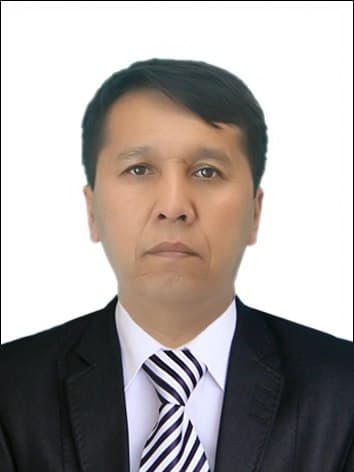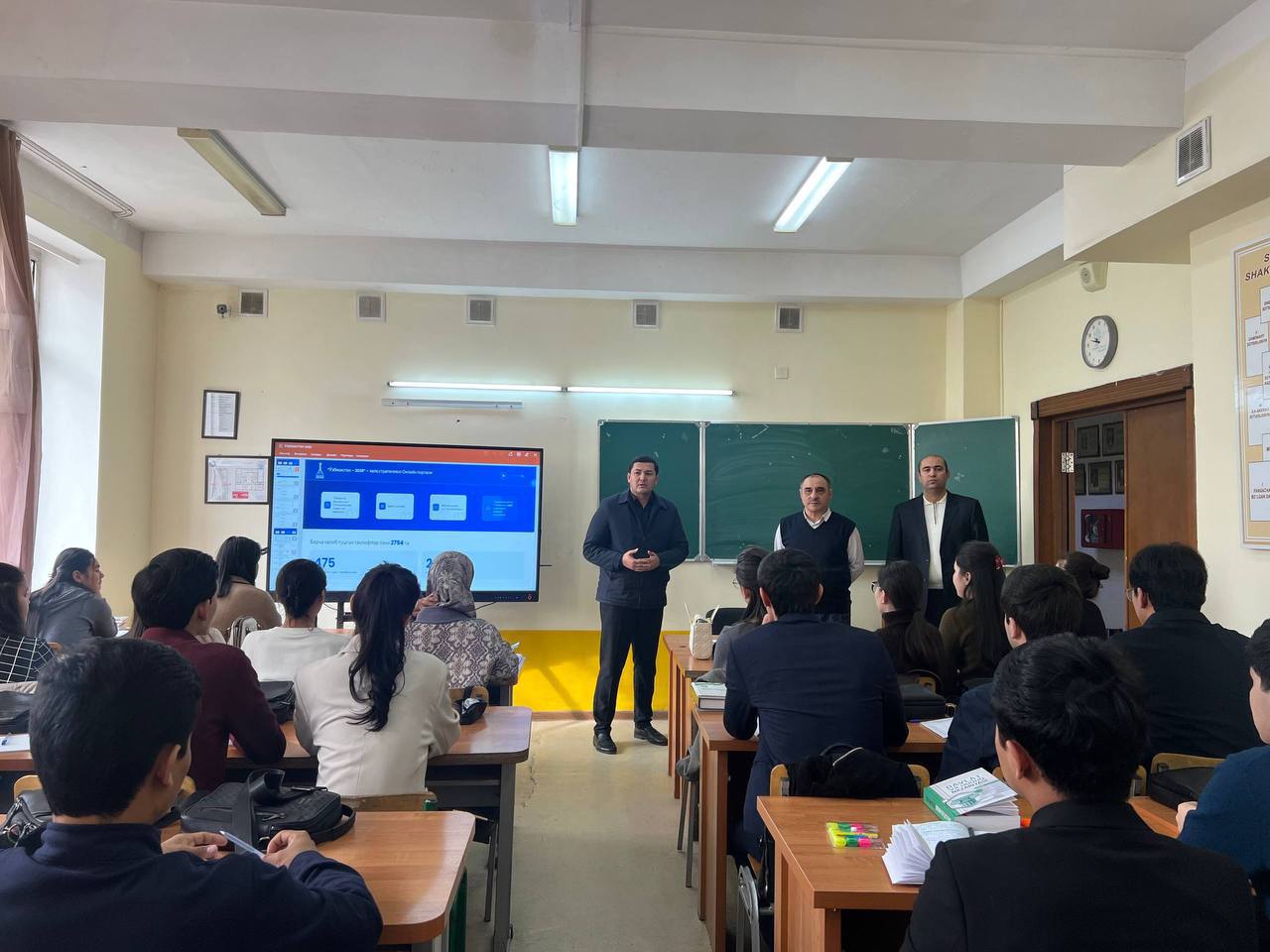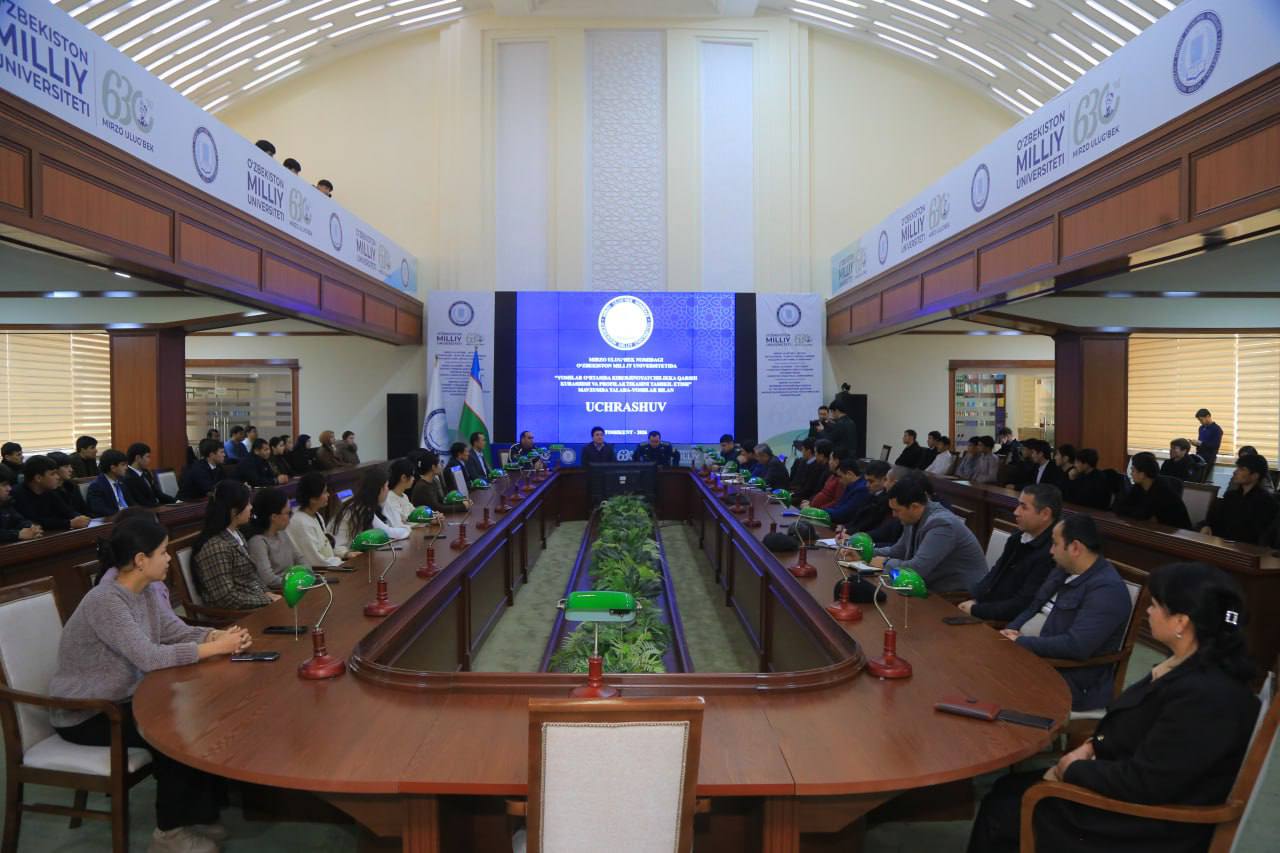
Adenbayev Bahtiyor – Head of the Department
100174, Universitet street 4, Olmazor district, Tashkent
Monday-Friday, 14:00 – 17:00
+99890 359 72 19
BRIEF INFORMATION ABOUT THE DEPARTMENT
The department was formed in 2021 on the basis of the newly created Faculty of Hydrometeorology of the National University of Uzbekistan in the 2021/2022 academic year in accordance with the Decree of the President of the Republic of Uzbekistan dated November 17, 2020 No. PD-4896 “On measures to further improve the hydrometeorological service of the Republic of Uzbekistan”.
Currently, the department has one doctor of sciences, two candidates of sciences, two senior teachers, one teacher, two interns and one basic doctoral student. Also, when teaching students in the educational process, prominent scientists and specialists from the Hydrometeorological Research Institute, doctor of technical sciences, professor will be accepted. S.V.Myagkov, candidate of technical sciences T.A.Akhmedova, from the Scientific Research Institute of Irrigation and Water Problems, doctor of technical sciences, professor I.E.Makhmudov.
The department has full-time and part-time studies in the areas of 60520100-Hydrometeorology, master’s degree in specialties 70520102-Hydrometeorology (by type of activity), 70520103 – 5A140703-Climate change and climate risk assessment, 70520104 – Glaciology and monitoring of snow cover. A system of basic doctoral studies (PhD) and doctoral studies (DSc) has been created in the specialties 11.00.03 – Land hydrology. Water resources. Hydrochemistry.
Graduates of the department work in the Ministry of Emergency Situations of the Republic of Uzbekistan, the Center for Hydrometeorological Service, the Ministry of Water Resources, the Uzbekhydroenergo Joint Stock Company, the State Committee on Ecology and Environmental Protection, the Academy of Sciences of the Republic of Uzbekistan and industry research institutes.
The main courses of the department are geophysics, hydrometry, hydraulics, atmospheric physics, synoptic meteorology, climatology, general hydrology, glaciology, lake studies, hydrometeorological calculations, hydrological forecasts, agrometeorology.
Currently, the faculty of the department, together with the staff of the Hydrometeorological Research Institute, are carrying out a scientific grant on the topic Develop a system for monitoring changes in the mass balance of glaciers in the context of global climate change and technologies describing the future state of glaciers.
1. The main training courses of the department for bachelors and masters
Subjects taught in the undergraduate (hydrometeorology)
| No. | Subject | Title Course Brief |
| 1 | Introduction to Hydrometeorology | Dedicated to the study of rivers, lakes, reservoirs, groundwater, glaciers, which are components of the hydrosphere, their features and patterns of events that occur as a result of the interaction of these components with the environment. |
| 2 | Geophysics | Dedicated to the study of the physical properties of the earth’s crust, formed during a long historical geological process – the lithosphere, atmosphere, hydrosphere and the laws of their interaction. |
| 3 | Hydraulics | Students get an idea of the basic physical properties of fluids, hydrostatic pressure, calculation of compressive strength, hydraulic flow elements, Bernoulli diagram, hydraulic calculations of pipes and channels, unloading, hydraulic jumps. |
| 4 | Hydrometry 6 | The main goal of the training course in the methods of generalization and calculation of these materials in the course of observations, carried out measuring work on water bodies. |
| 5 | Hydrophysics and water balance studies | Studies the physical properties of natural waters, the laws governing the physical processes of water bodies, the water balance of lakes, rivers, glaciers and reservoirs. |
| 6 | General hydrology | It studies the components of the hydrosphere, oceans, seas, rivers, lakes, glaciers, groundwater, their specific properties and the laws of events that occur as a result of the interaction of each component with the environment |
| 7 | Statistical methods in hydrometeorology | Determination of statistical parameters of a number of random variables, consisting of data from hydrometeorological observations, the formation of basic skills and experience in modeling hydrometeorological processes. |
| 8 | Lakes science | Acquaintance with natural and artificial lakes-reservoirs, the laws of their geographical distribution and hydrology. |
| 9 | Glaciology | Providing knowledge about the distribution of glaciers on the surface, the physical properties of glaciers in the form of minerals and rocks, snow cover and snow line, ice saturation conditions, structure, movement, vibration and development or degradation of glacial mass, theoretical foundations for calculating hazardous glacial events. Gain the skills and experience to use this knowledge in practice. |
| 10 | Organization and planning of work in hydrometeorological services | Teaches the organization and planning of work in hydrometeorological services, responsibility for labor protection. It consists of the development of skills and experience in a comprehensive analysis of production from a social, legal, psychological and technical point of view. |
| 11 | Climate change and its impact on the natural resource potential of the Republic of Uzbekistan | The safety and efficiency of all spheres of human economic activity depend on the weather and climate. The main objective of the course is to provide knowledge about meteorological quantities, events and factors in order to teach how to effectively use meteorological information in human activities. |
| 12 | Hydrometeorological forecast | Studied, in order, is the compilation of short-term and long-term forecasts of water discharge and river level, forecasts of spring floods for lowland rivers, forecasts of spring-summer floods for mountain rivers, forecasts of freezing of water bodies. |
| 13 | Hydrometeorological calculations | To acquaint and teach students about the laws of the formation of river flow and the water regime of rivers; methods for calculating the runoff rate, annual variability and annual runoff distribution, the minimum and maximum water discharge of rivers and a quantitative assessment of the water regime and water balance elements (precipitation, evaporation from the water surface), be able to apply these methods in practice. |
Subjects taught in the magistracy by specialty
70520102 – Hydrometeorology (by type of activity),
70520103 – Climate change and climate risk assessment,
70520104 – Glaciology and snow monitoring
| № | Subject | Title Course Brief |
| 1 | Sedimentation balance of reservoirs | To teach the laws of siltation of reservoirs, methods of their calculation and forecast. The masters will develop knowledge, skills and competencies for the effective use of reservoirs. |
| 2 | Hydrometeorological calculations and forecasts Гидрометеорологик ҳисоблашлар ва прогнозлар | Assessing the impact of human activities on river runoff and providing theoretical knowledge on the application of mathematical statistical methods, probability theory in hydrological calculations and forecasts, acquiring skills and experience in the practical application of this knowledge. |
| 3 | Hydrochemistry of reservoirs | The course consists of teaching the hydrochemical processes occurring in natural reservoirs, their specific properties, the laws of the formation of the chemical composition of natural waters. |
| 4 | Hydrometeorology of lakes and reservoirs | Teaches methods for calculating the hydrometeorological regime of lakes, the elements of inflow and outflow of the lake water balance equation and the acquisition of skills and experience in applying these methods in practice. |
| 5 | Hydrometeorological Basics of Water Resources Protection | Teaches the laws of the distribution of water resources on land and the hydrometeorological regimes of water bodies. Knowledge, skills and competencies for the effective use and protection of water resources will be formed. |
| 6 | Fundamentals of hydrochemistry and hydroecology 11 Snow science Snow science is a branch of the discipline of glaciology that studies the snow and snow cover of the Earth, their origin, features of formation, temporal dynamics and distribution in space, as well as chemical, physical, mechanical, crystallographic and many other things. | The course teaches the formation of hydrometeorological regime of water bodies, methods for calculating the elements of inflow and outflow, the water balance equation. Skills and experience will be formed in the application of methods for assessing the hydrochemical regime and assessing the hydroecological situation of water bodies. |
| 7 | Climate risks and their assessment. | Consists of providing general information on current and future observed climate risks, adaptation to climate change, and training in climate risk assessment techniques. |
| 8 | Monitoring of glaciers and snow cover | Dissipline, which studies glaciers, snow and snow cover, their origin, properties of formation, temporal dynamics and distribution in space, as well as chemical, physical, mechanical, crystallographic and many other properties. |
| 9 | Fundamentals of Glaciology | Studies the distribution of glaciers’ surface, their structure and basic parameters, the pulsation of glacier movement, the mass balance of glaciers and methods of their detection |
| 10 | Mathematical modeling of hydrometeorological processes | Mathematical modeling of hydrometeorological processes is a mathematical representation of this fact, one of the variants of the model as a system, the study of which allows you to obtain information about another system. A mathematical model is specifically designed to predict the behavior of a real object, but it always represents one or another level of its idealization. |
| 11 | Snow science | Snow science is a branch of the discipline of glaciology that studies the snow and snow cover of the Earth, their origin, features of formation, temporal dynamics and distribution in space, as well as chemical, physical, mechanical, crystallographic and many other things. |
- About applicants and scientific works
| No | Full name applicant | Scientific degree, title | Dissertation topic |
| 1. | 1. Khamzaeva Zhanat Temirbekovna | Flow dynamics of the lower reaches of the Amu Darya River and its dependence on hydrometeorological conditions |
Information about local and foreign partners.
The Department of Hydrometeorology cooperates with the Research Institute of Hydrometeorology, the Karakalpak State University, the Research Institute of Water Problems, the Friborg University of Switzerland, the Taraz University of Kazakhstan, and the Moscow State University of Russia.
Composition of the department
| No. | Full name | |
| 1. | Adenbaev Bakhtiyor Embergenevich Doctor of Geographical Sciences, Head of the Department | bahtiyor.adenbayev@mail.ru |
| 2. | Artikova Farida Yakubovna Ph.D., Associate Professor | f.artikova@mail.ru |
| 3. | Umirzokov Kulomzhon Ungarboevich Doctor of Philosophy in Geographical Sciences (PhD), Senior Lecturer | g.umirzakov@gmail.com |
| 4. | Sagdeev Nail Zavdyatovich senior lecturer | n.sagdeev@mail.ru |
| 5. | Isakova Aziza Yadgarovna senior lecturer | isakovaziza@mail.ru |
| 6. | Rapikov Barkamol Rastam teacher | barkamol_rapiqov@mail.ru |
| 7. | Umarov Alisher Zokirovich trainee teacher | alisher. |
| 8. | Kalabaev Salauat Bakhitai ul. trainee teacher | salauat.kalabayev@mail.ru |
| 9. | Saidova Dono Anvarovna head laboratories | saidovadono50@mail.com |
| 10. | Khamzaeva Zhanat Temirbekovna 1st year doctoral student | xamzayeva.j@mail.ru |
Circle
Scientific circle “Young hydrometeorologists”


